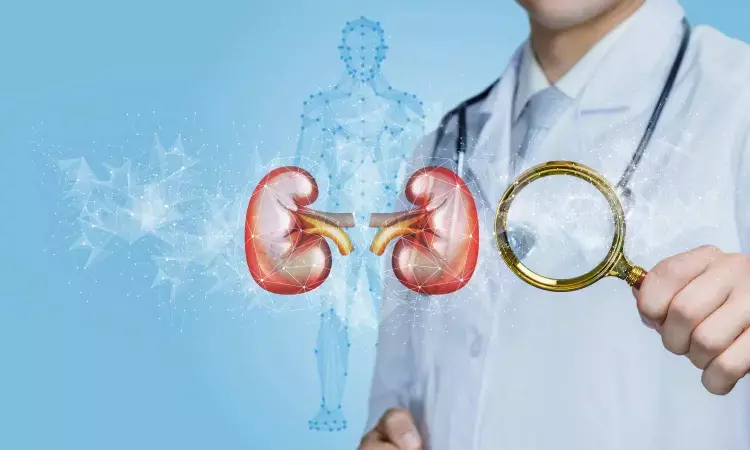- Home
- Medical news & Guidelines
- Anesthesiology
- Cardiology and CTVS
- Critical Care
- Dentistry
- Dermatology
- Diabetes and Endocrinology
- ENT
- Gastroenterology
- Medicine
- Nephrology
- Neurology
- Obstretics-Gynaecology
- Oncology
- Ophthalmology
- Orthopaedics
- Pediatrics-Neonatology
- Psychiatry
- Pulmonology
- Radiology
- Surgery
- Urology
- Laboratory Medicine
- Diet
- Nursing
- Paramedical
- Physiotherapy
- Health news
- Fact Check
- Bone Health Fact Check
- Brain Health Fact Check
- Cancer Related Fact Check
- Child Care Fact Check
- Dental and oral health fact check
- Diabetes and metabolic health fact check
- Diet and Nutrition Fact Check
- Eye and ENT Care Fact Check
- Fitness fact check
- Gut health fact check
- Heart health fact check
- Kidney health fact check
- Medical education fact check
- Men's health fact check
- Respiratory fact check
- Skin and hair care fact check
- Vaccine and Immunization fact check
- Women's health fact check
- AYUSH
- State News
- Andaman and Nicobar Islands
- Andhra Pradesh
- Arunachal Pradesh
- Assam
- Bihar
- Chandigarh
- Chattisgarh
- Dadra and Nagar Haveli
- Daman and Diu
- Delhi
- Goa
- Gujarat
- Haryana
- Himachal Pradesh
- Jammu & Kashmir
- Jharkhand
- Karnataka
- Kerala
- Ladakh
- Lakshadweep
- Madhya Pradesh
- Maharashtra
- Manipur
- Meghalaya
- Mizoram
- Nagaland
- Odisha
- Puducherry
- Punjab
- Rajasthan
- Sikkim
- Tamil Nadu
- Telangana
- Tripura
- Uttar Pradesh
- Uttrakhand
- West Bengal
- Medical Education
- Industry
Study explores link between dietary iron intake and diabetic kidney disease in individuals with diabetes

China: In a significant development in diabetes research, a new study sheds light on the association between dietary iron intake and the risk of diabetic kidney disease (DKD) among individuals with diabetes. Published in the Endocrine Journal, the study offers valuable insights into dietary factors influencing kidney health in diabetic patients.
The researchers found a lower risk of diabetic kidney disease with ≥ 12.59 mg of dietary iron, especially in males, younger, have better blood sugar control, heavier weight, and ex-smokers.
Diabetic kidney disease, a common complication of diabetes, poses a significant health burden globally. Despite advancements in diabetes management, the precise mechanisms underlying DKD development remain incompletely understood. Emerging evidence suggests that dietary factors, including iron intake, may play a role in the pathogenesis of DKD.
Against the above background, Yaoming Xue, Southern Medical University, Guangzhou, China, and colleagues aimed to determine the correlation between dietary iron intake and diabetic kidney disease among diabetic adults by conducting a cross-sectional study.
The study enrolled 8118 participants with diabetes from the National Health and Nutrition Examination Survey (NHANES) 1999–2018. 24-hour recall interviews were used to obtain dietary iron intake. Diabetic kidney disease was defined as albumin creatinine ratio (ACR) ≥ 30 mg/g or eGFR < 60 mL/min per 1.73 m2.
Three weighted logistic regression models were utilized to investigate the odd ratio (OR) for DKD. Stratified analyses were performed by age, gender, BMI, HbA1c, hypertension status, HbA1c, smoking status, and diabetes types.
The researchers reported the following findings:
· Among 8118 participants (51.6% male, mean age 61.3 years), 40.7% of participants suffered from diabetic kidney disease.
· With the adjustment of potential covariates, we found that ≥ 12.59 mg of dietary iron was related to a lower risk of diabetic kidney disease (OR = 0.78; OR = 0.79).
· In stratified analyses, higher iron intake was negatively related to diabetic kidney disease, especially among those who were male, < 60 years old, those with HbA1c < 7.0%, those with hypertension, and those who were ex-smokers. The result remained robust in sensitivity analyses.
"We found that ≥ 12.59 mg of dietary iron is associated with a lower risk of diabetic kidney disease, especially in males, younger, have better blood sugar control, heavier weight, and those who were ex-smokers," the researchers wrote.
In conclusion, the study elucidates the association between dietary iron intake and DKD risk among individuals with diabetes. By highlighting the potential impact of dietary factors on kidney health, the findings underscore the importance of holistic approaches to diabetes management that encompass both pharmacological and lifestyle interventions.
Reference:
Wu, Y., Xiao, M., Chen, J. et al. Association of dietary iron intake with diabetic kidney disease among individuals with diabetes. Endocrine (2024). https://doi.org/10.1007/s12020-024-03819-y
Dr Kamal Kant Kohli-MBBS, DTCD- a chest specialist with more than 30 years of practice and a flair for writing clinical articles, Dr Kamal Kant Kohli joined Medical Dialogues as a Chief Editor of Medical News. Besides writing articles, as an editor, he proofreads and verifies all the medical content published on Medical Dialogues including those coming from journals, studies,medical conferences,guidelines etc. Email: drkohli@medicaldialogues.in. Contact no. 011-43720751


